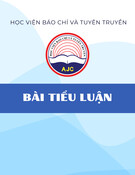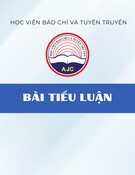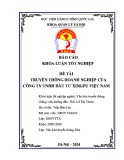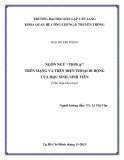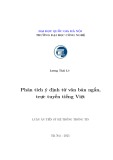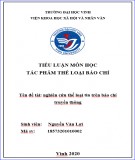
HUE UNIVERSITY
COLLEGE OF FOREIGN LANGUAGE
FACULTY OF ENGLISH
ESSAY
BRITISH CULTURAL II
Topic :
MEDIA
H C VIÊN TH C HI N:Ọ Ự Ệ
LÊ ANH TU NẤ
L P: ANH B2K6DỚ

Hu , tháng 3/2012ế
PART I. INTRODUCTION
British people watch a lot of television, but this does not mean that they have given
up reading. The British are the third largest consumers of newspapers in the world (after
the Japanese and the Swedes). Each day about 80 % of all households buy one of the
main national newspapers. Media of Britain consist of several different types of
communications media: television, radio, newspapers, magazines, and Internet - based
Web sites.
In this assignment, I will present some contents about press, the BBC, television of
Britain.
PART II. DISCUSSION
2.1. The importance of the national press
Newspaper publication is dominated by the national press, which is an indication of
the comparative weakness of regional identity in Britain.
The national papers always appear in the mornings. The morning newspaper is a
British household institution; such an important one that, until the laws were relaxed in
the early 1990s, newsagents are the only shops that were allowed to open on Sundays.
The “Sunday papers” are so-called because that is the only day on which they
appear. Some of them are sisters of a daily but employing separate editors and journalists.

Another indication of the importance of “the papers” is the morning “paper round”.
Teenager delivered to readers’s door their morning paper every day in order to earn a bit
of extra pocket money.
2.2. The two types of national newspaper
All newspapers in Britain, daily or Sunday ones, can broadly he divided into the
quality papers and the popular press. 1
The ‘quality papers’, or ‘broadsheets’, cater for the better educated readers. They
include The Star, The Daily Mirror, The Daily Mail, The Daily Express, The Sun
The quality papers
The ‘popular papers’, or ‘tabloids’, sell to a much larger readership. They include
The Daily Telegraph, The Guardian, The Independent, The Times , The Financial Times

The popular papers
Differences between tabloids and broadsheets:
Tabloids Broadsheets
Contain less print and far more pictures Contain more print and less pictures
Uses larger headlines Uses normal headlines
Write in a simpler style of English Write in a much higher level of English
Concentrate on ‘human interest’ stories
sex and scandal
Devote much space to politics and other
serious news
Equal amounts of attention to sport Equal amount of attention to sport
Different approaches and subjects Different approaches and subjects
Twice as large
2.3. The characteristics of the national press
2.3.1. Politics
The way politics is presented in the national newspapers reflects the fact that British
political parties are essentially parliamentary organizations. Although different papers

have differing political outlooks, none of the large newspapers is an organ of a political
party.
What counts for the newspaper publishers is business. All of them are in the
business first and foremost to make money.
The British press is controlled by a rather small number of extremely large
multinational companies. One of notable features is its freedom from interference from
government influence, which is virtually absolute.
2.3.2. Sex and scandal
The other feature of the national press which is partially the result of the
commercial interests of its owners is its shallowness.
Some of the tabloids have almost give up even the pretence of dealing with serious
matters. Apart from sport, their page are full of little except stories about the private lives
of famous people. Some time their “stories” are not articles at all, they are just excuses to
show pictures of almost naked women.
This emphasis on revealing the details of people’s private lives has led to discussion
about the possible need to restrict the freedom of the press. Many journalists now appear
to spend their time trying to discover the most sensational secrets of well-known
persionalities, or even of ordinary people.
Complaints regarding invasions of privacy are dealt with by the Press Complaints
Commission (PPC). This organization is made up of the newspaper editors and
journalists. It follows a Code of Practice which sets limits on the extent to which new
papers should publish details of people’s private lives. Many people are not happy with
this arrangement and various governments have tried to formulate laws on the matter.
However, against the right to privacy the press has successfully been able to oppose the
concept of the public’s “right to know”.
British adults never read comics, they are read only by children. Most people don’t
use newspapers for “serious” news. For this, they turn to another source-broadcasting.

